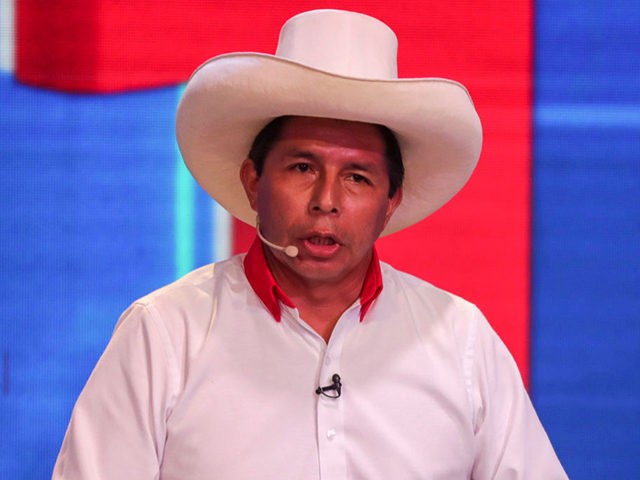Police in Peru opened a “preliminary” police investigation against presidential election frontrunner Pedro Castillo, a far-leftist, this weekend in response to accusations that he lied about holding a second job when filing paperwork to run for office.
The probe into “false declarations in administrative procedure” and “ideological falsehood” occur as Castillo, who handily won the first round of elections leading into the June 6 runoff vote, saw his lead against rival Keiko Fujimori slip into margin-of-error territory last week. Fujimori is a staunch conservative making her third appearance in a presidential runoff and was arrested in 2018 on charges of corruption.
Castillo’s lead began to rapidly diminish as details of the political platform of his party, Free Peru, became more widely known, including the platform’s praise for communist mass murderers Vladimir Lenin and Fidel Castro. Castillo also refused for over a week to accept debate challenges from Fujimori or disclose who he would place in a hypothetical cabinet. Castillo agreed to a debate with Fujimori this weekend but failed to show, leaving Fujimori and the moderator waiting for 40 minutes.
The Lima Public Ministry announced the investigation Saturday, noting it was “preliminary,” but at the police level, and clarifying that the allegation in question is that Castillo had a job running an investment business that he did not declare to the government when filing to run for office, as required. Local newspapers reported the investigation will last for 30 days, longer than the time left until Peruvians go to the polls on June 6.
The investigation will aim to clarify the status of the company that Castillo reportedly ran as general manager — the Chota Consortium of Entrepreneurial Investors — if it was active at the time that Castillo failed to disclose its existence, if it paid taxes, if it received Chinese coronavirus emergency funding, and if it has any ties to government projects.
Castillo claimed, following the announcement of the investigation, that the company was “never operational” and denied stealing money from the company or obscuring his ties to it for personal gain.
As the Argentine news network Infobae noted Saturday, Castillo’s legal entanglement is not the first for Free Peru. The political party’s legal representative Ana María Córdova was convicted in 2018 of falsifying signatures on a petition necessary to incorporate a political party in the country. The crime allegedly occurred in 2013.
Fujimori faced years of legal woes before winning a spot in the June runoff (Peru requires a candidate to earn 51% of the vote or more to win the presidency in the first round; if not, the top two vote-getters go on to a runoff election). Fujimori was arrested in 2018 on charges of taking as much as $1 million in bribes from Odebrecht, a Brazilian contracting firm notorious for having allegedly bribed politicians in nearly every country in Latin America. Prosecutors claim that, under Fujimori, her Popular Force party laundered Odebrecht funds through campaign events. Fujimori’s case remains in process and she has denied all allegations.
“Persecution has disguised itself as justice in our country. They have persecuted me for 18 years and have never proven one accusation, and just like that, with no proof, I have been deprived of my freedom,” Fujimori said in a written statement following her arrest. “Last week, they abusively annulled the pardon my father received, and now they arrest me and other Fujimoristas … that is political persecution!”
Fujimori is the daughter of former Peruvian President Alberto Fujimori, who at press time is serving a 25-year prison sentence for alleged crimes against humanity. Fujimori, an octogenarian, has attempted to use legal measures to receive a house arrest sentence given his old and frail state, but remains in prison. Pedro Pablo Kuczynski, a former president who defeated Keiko Fujimori in 2016, pardoned the elder Fujimori, but a Peruvian court overturned the petition. Kuczynski resigned after a struggle between Fujimori and her brother, Kenji Fujimori, implicated Kuczynski in a corruption scheme.
Alberto Fujimori ruled Peru as a hardliner conservative. Under his tenure, the Peruvian government defeated a terrorist insurgency by the Marxist group Shining Path. Keiko Fujimori, then a teenager, served as First Lady following Fujimori’s divorce and subsequent presidential campaign against ex-wife Susana Higuchi.
The Keiko campaign has attempted to frame the current campaign as a struggle to keep radical Marxism from overtaking the c country once more, given the Free Peru party’s radical agenda.
“Socialism does not advocate for freedom of the press, but for a press committed to education and the cohesion of the people,” Free Peru’s political platform reads. “[Vladimir] Lenin had a great point when he said that true freedom of the press is only possible when it is liberated from the yoke of capitalism. Fidel [Castro] also said: ‘…mass media are in the hands of those who threaten human survival with their immense economic, technological, and military resources.”
Polling shows concerns about communism may be tilting the scales in Fujimori’s favor. A poll published Sunday by Ipsos showed Castillo receiving 51.1 percent support, a slim lead over Fujimori’s 48.9 percent. The difference in the two numbers is within the poll’s margin of error, meaning the two are in a statistical tie. Another poll by the firm CPI published Sunday showed a similar difference between the candidates with a far higher rate of undecided voters: 34.4 percent support for Castillo, 32.6 percent for Fujimori, 18% voting blank (voting is mandatory in Peru), and 15% undecided.

COMMENTS
Please let us know if you're having issues with commenting.